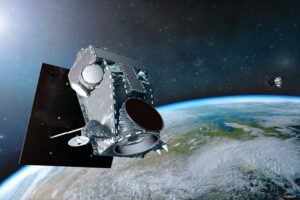Maxar to retain but restructure GEO satellite business

WASHINGTON — Maxar Technologies has decided not to sell or shut down its commercial geostationary orbit satellite business, but will restructure it with a greater emphasis on smaller satellites and government customers.
In an interview with SpaceNews, Walter Scott, executive vice president and chief technology officer of Maxar, said that after months of analysis about the future of its Space Systems Loral business unit, including options to sell the business or even shut it down, the company has decided to keep it.
“SSL has more value to us than any prospective buyer was willing to pay,” he said. “The cost and the risk that would be associated with the wind down would have been very destructive for our customers and our team and unattractive for investors.”
Instead, the company will restructure the business, retaining its 1300 series of large GEO satellites but devoting more attention to the smaller “Legion” class of spacecraft, named after the WorldView Legion constellation SSL is building for DigitalGlobe, also owned by Maxar. At the same time, the company will look to business from U.S. government agencies as well as other nations.
That was the original plan as Maxar established itself as a U.S. company and became eligible for government business. “And then we had the bottom fall out of the GEO communications market,” Scott said, a reference to the extended drought in commercial GEO satellite orders that had constituted the bulk of SSL’s business and triggered the strategic review of SSL’s future. “We concluded the original strategy was still the best one.”
That strategy has been refined, though, including restructuring the company. Scott said Maxar will be “optimizing our industrial footprint” over the course of the year. The company sold one building at SSL’s Palo Alto, California, campus in December for $70 million. “That was a classic case where it was more valuable to somebody else than it was to us,” he said. The company will reduce its use of leased space, he said, and may consider sale-leaseback agreements for other buildings, while retaining its core assembly facilities.
Maxar is also laying off about three percent of SSL’s current workforce of nearly 2,000 people as part of the restructuring. In the future, Scott said the company expects to “flex the workforce up or down” based on business requirements.
Another part of the restructuring will be a name change. “We are revising the Maxar organizational structure to create one Maxar,” Scott said. SSL will now be known as the space solutions group of Maxar and run by Megan Fitzgerald, SSL’s senior vice president of program management.
Even with those changes, Scott said he expected the business to run at a loss for at least the next two years. “We can’t cut our way back to profitability because we have to meet our commitments to our customers above everything else,” he said. He declined to estimate how much of a loss Maxar projects, deferring those questions to an earnings call by Maxar leadership scheduled for later Feb. 28. He did note that the company has “ample liquidity” to cover those losses.
Scott said while there is still demand for the larger 1300-series satellites, including a proposal SSL made to NASA to use as it the Power and Propulsion Element of the agency’s lunar Gateway, there’s growing interest in the smaller Legion series. That includes, he said, using it as a bus for small GEO satellites in additional to its original role as an Earth observation satellite.
One example he cited was the Legion-X program, which would offer additional Legion spacecraft to “various allied governments” for Earth-imaging missions. He didn’t identify any specific customers, but industry sources say Maxar is expected to pursue plans by Chile to replace its existing imaging satellite with either a smallsat replacement or a share of a commercial Earth observation satellite.
Maxar is also partnered with Thales Alenia Space on a proposal to build Telesat’s broadband LEO constellation, which will take advantage of what it has been developing for WorldView Legion. “There is a fair amount of cross-fertilization between what we are doing for the Telesat LEO effort and the WorldView Legion effort,” he said.
The problems that led to the restructuring of SSL were also responsible for the decision announced Jan. 30 to terminate its agreement with DARPA on the Robotic Servicing of Geosynchronous Satellites (RSGS) program. SSL had planned to provide a satellite bus that, combined with servicing hardware developed by the Naval Research Lab, would demonstrate the ability to repair GEO satellites.
“The issue with RSGS was simply that it was a bridge too far,” Scott said. “Given the current situation, it was not the best use of Maxar’s capital.” He said the decline in the GEO market and the failure of the WorldView-4 satellite, announced in early January, were factors in that decision.
He added that Maxar was still interested in satellite servicing, and was continuing its work with NASA on the Restore-L program to develop a satellite servicing demonstration mission for low Earth orbit spacecraft. “It remains an area that is of great interest to us,” he said, but that it was too soon to say when the company might revisit developing a commercial satellite servicing system.
from SpaceNews.com https://ift.tt/2XviGdS
Comments
Post a Comment